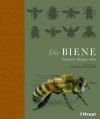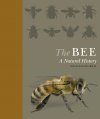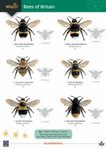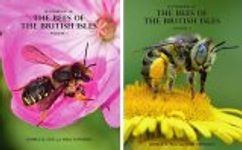Out of Print
By: Noah Wilson-Rich(Author), Kelly Allin(Contributor), Norman L Carreck(Contributor), Andrea Quigley(Contributor)
224 pages, 180+ colour & 40+ b/w photos and illustrations
![Die Biene Die Biene]()
Click to have a closer look
About this book
Related titles
Recommended titles
About this book
Language: German
Bees pollinate more than 130 fruit, vegetable, and seed crops that we rely on to survive. Bees are crucial to the reproduction and diversity of flowering plants, and the economic contributions of these irreplaceable insects measure in the tens of billions of dollars each year. Yet bees are dying at an alarming rate, threatening food supplies and ecosystems around the world. In this richly illustrated natural history of the bee, Noah Wilson-Rich and his team of bee experts provide a window into the vitally important role that bees play in the life of our planet. Earth is home to more than 20 000 bee species, from fluorescent-colored orchid bees and sweat bees to flower-nesting squash bees and leaf-cutter bees. The Bee: A Natural History takes an incomparable look at this astounding diversity, blending an engaging narrative with practical, hands-on discussions of such topics as beekeeping and bee health. It explores our relationship with the bee over evolutionary time, delving into how it came to be, where it stands today, and what the future holds for humanity and bees alike.
Summary in German:
Rund 20 000 Bienenarten summen und brummen auf unserem Planeten. Die Westliche Honigbiene beispielsweise, die bekannteste Vertreterin der Bienen, ist das kleinste Haustier des Menschen und gleichzeitig von unschätzbarer Bedeutung als Blütenbestäuberin von Nutz- und Wildpflanzen. Seit Jahrtausenden wird sie vom Menschen genutzt und gehalten.
Dieses Buch nimmt uns mit auf eine spannende Entdeckungsreise in die Welt der Bienen, enthüllt ihre erstaunlichen Fähigkeiten, schildert die unterschiedlichen Lebensweisen von Bienen, die alleine hausen, und solchen wie der Honigbiene, die in Staaten leben. Es gibt einen Einblick in Evolution, Biologie und Verhalten der unterschiedlichen Bienenarten und erzählt die lange gemeinsame Geschichte von Mensch und Honigbiene.
Customer Reviews
Out of Print
By: Noah Wilson-Rich(Author), Kelly Allin(Contributor), Norman L Carreck(Contributor), Andrea Quigley(Contributor)
224 pages, 180+ colour & 40+ b/w photos and illustrations

























![Libellen Europas: Der Bestimmungsführer [Field Guide to the Dragonflies of Britain and Europe]](http://mediacdn.nhbs.com/jackets/jackets_resizer_medium/25/251176.jpg?height=150&width=95)
![Flora Helvetica: Illustrierte Flora der Schweiz [Flora Helvetica: Illustrated Flora of Switzerland]](http://mediacdn.nhbs.com/jackets/jackets_resizer_medium/26/264404.jpg?height=150&width=101)
![Lebensraum Federkleid: Federn und Federbewohner Heimischer Vögel [Plumage as Habitat: Feathers of Domestic Birds and their Parasitic Residents]](http://mediacdn.nhbs.com/jackets/jackets_resizer_medium/22/225536.jpg?height=150&width=103)
![Flora Vegetativa: Ein Bestimmungsbuch für Pflanzen der Schweiz im Blütenlosen Zustand [Flora Vegetativa: An Identification Book for Plants in Switzerland without Flowers]](http://mediacdn.nhbs.com/jackets/jackets_resizer_medium/24/249633.jpg?height=150&width=98)
![Schmetterlinge der Alpen: Der Bestimmungsführer für alle Arten [Butterflies of the Alps: Identification Guide to All Species]](http://mediacdn.nhbs.com/jackets/jackets_resizer_medium/21/210853.jpg?height=150&width=95)
![Pilzführer Schweiz [Mushroom Guide to Switzerland]](http://mediacdn.nhbs.com/jackets/jackets_resizer_medium/24/241878.jpg?height=150&width=103)

![Jugendstadien der Heuschrecken der Schweiz [Juvenile Stages of the Grasshoppers of Switzerland]](http://mediacdn.nhbs.com/jackets/jackets_resizer_medium/25/252131.jpg?height=150&width=103)
![Farne, Schachtelhalme und Bärlappe: Der Naturführer zu den Farnpflanzen Mitteleuropas [Ferns, Horsetails and Clubmosses: The Field Guide to the ferns of Central Europe]](http://mediacdn.nhbs.com/jackets/jackets_resizer_medium/25/254162.jpg?height=150&width=104)
![Das Herbarium des Felix Platter: Die Älteste Wissenschaftliche Pflanzensammlung der Schweiz [The Herbarium of Felix Platter: The Oldest Scientific Plant Collection of Switzerland]](http://mediacdn.nhbs.com/jackets/jackets_resizer_medium/23/230349.jpg?height=150&width=120)
![Die Geheimnisvolle Welt der Pilze: Das Natur-Mitmachbuch für Kinder [The Mysterious World of Fungi: The Nature Activity Book for Children]](http://mediacdn.nhbs.com/jackets/jackets_resizer_medium/22/225586.jpg?height=150&width=136)
![Landschaften und Geologie der Schweiz [Landscapes and Geology of Switzerland]](http://mediacdn.nhbs.com/jackets/jackets_resizer_medium/24/245388.jpg?height=150&width=99)